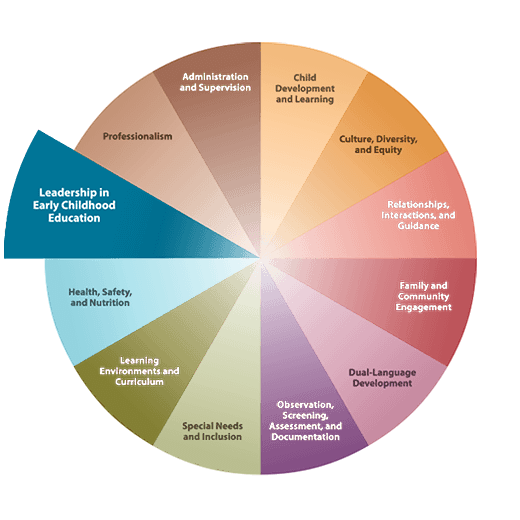Leadership has been described as the intersection of knowledge, skills, character attributes, and personality traits that motivate others to work toward a common goal; it is demonstrated by early childhood educators in every role within the profession. In addition to possessing expertise in specific areas — such as understanding how children develop and learn, working with families, or supervising staff — early childhood education leaders need to understand the early childhood system itself and how policy shapes the quality of services available to children and families. A starting point for providing leadership is to evaluate one's current understanding of the early care and education system, reflect regularly to assess changes in one’s knowledge, and determine how that under - standing and knowledge can continue to develop (Whitebook and Austin 2009).
The diverse sectors in the early education profession challenge leaders to collaborate across many types of services and among variable poli - cies. Early childhood education services do not exist in isolation, and leaders are further challenged to understand the complex array of issues that impact the profession, develop skills to work collaboratively across disciplines and interest groups, and improve the quality of early care and education services that influence life opportunities for children and their families.
Download the California ECE Competencies
This document requires the Adobe Acrobat Reader. Download the plug-in.

Framing questions identify some of the major themes in this competency. They provide you with a starting point. As you explore this competency, add your own framing questions for issues you want to further examine.
Keep these dispositions in mind as you explore the Framing Questions. If you mindfully adopt these dispositions, you will realize the Desired Outcomes for Practitioners and for Children.
The CompSAT Keys to Reflection and Inquiry offer you a protocol to use in whatever setting you work as an early childhood educator. Learn how you can integrate the six Keys into your work. Select one of the Keys below to practice reflecting with questions related to the competency area of Leadership in Early Childhood Education.

Choose from one of the Keys below to view additional information related to this Competency!

Newsletters can be valuable tools for communicating with parents and your community. Why not also use them for documenting your work in a particular area? Take a look at the newsletter series that one director wrote that chronicled the work she, her staff, and the whole community did to re-envision their program. A wide variety of free templates are available online for creating a newsletter that fits your style and needs.
